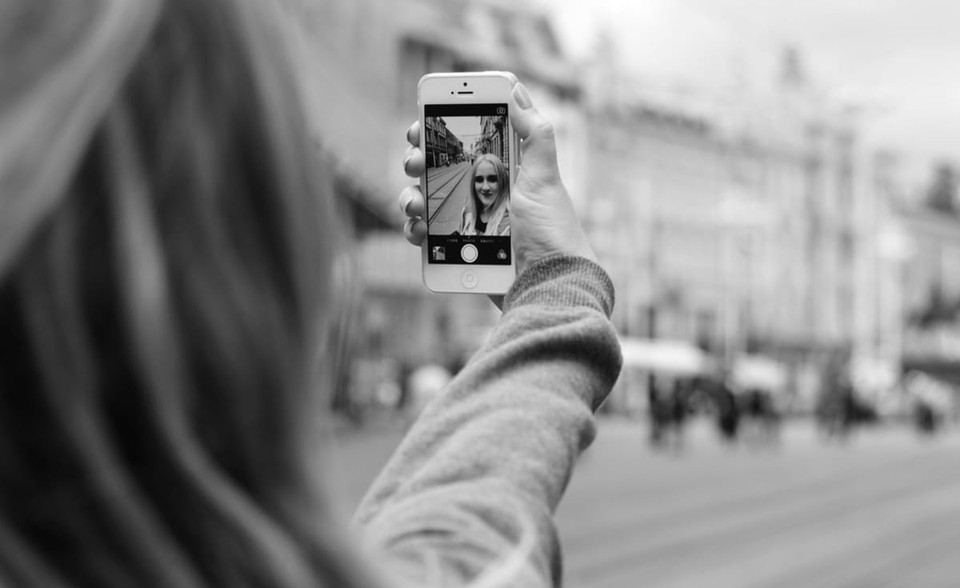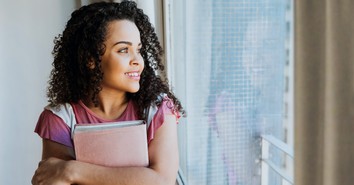Consequences of a Selfie Culture

My friends and I were “hashtags” for Halloween this year. Every year, we run a local 10k race in costume. We’ve been Incredibles, Monopoly game pieces, blind referees, Scrabble letters, and we even ran with a stretcher one year as an EMT squad. So this year, we decided to brush up on our social media skills and dress as hashtags. I chose to be the #selfie.
I’ll be the first to admit I am prejudiced against selfie takers. And when I was asked to write about “the consequences of selfies,” I thought it would be the perfect outlet to warn people about the dangers of creating a digital footprint of self-centeredness. But as I explored the selfie culture, and experienced it for myself, I developed a more well rounded perspective. And now that I’ve lived a day in the life of the #selfie, I’d like to share my perspective on the selfie culture – the good, the bad and the ugly.
The Good:
1. Posting a selfie takes confidence. Selfie-takers are comfortable in their own skin. (I’m not talking about the ones who alter their images to fix all their perceived flaws.) They are confident enough to show the world who they are and what they stand for. They are not filled with self-doubt or insecurity. I’d say that’s a good thing.
2. Selfie takers embrace imperfection. People who take unaltered, real-to-life selfies are not perfectionists. They are not afraid to take action and show more than their “good side.” They are more concerned with documenting the moment than perfecting the way it looks to others.
3. Taking a selfie is a form of self-expression. As we move into a more visual world, where a picture is worth a thousand words, we have discovered new ways of expressing our feelings. Emoticons, Instagram and Pinterest are proof that the new generation values the visual. Selfies are naturally an effective way to express oneself in a visual context.
The Bad:
1. Selfie takers seem self-absorbed. I follow many of my daughter’s friends and other teens on Instagram and I make judgments about the girls who post too many selfies. It almost doesn’t matter if my assumption is accurate – because social media is often the first impression we give to others, and it’s difficult to overcome a reputation formed by viewing 100 selfies of a person. I always tell my daughter and her friends to keep a 10:1 ratio on their profiles – ten photos from behind the lens for every one photo in front of the lens.
2. Selfies can attract the wrong kind of attention. Those gang signs and provocative eyes might seem harmless or silly but they send a strong message and it’s probably not the intended message. Remember, you are not there to explain, justify or defend every photo – it has to speak for itself on the world wide web, filled with people who were not there in the moment when you decided to snap a silly photo and post it on your page.
3. Selfies are permanent. Even with the disappearing functionality of Snapchat and Periscope, it’s still important to remember your digital footprint will follow you forever. Photos and videos that have been “deleted” have a way of showing up later in life, when you least expect it. Imagine running for public office and having someone resurrect 1,000 photos of you making duck faces.
The Ugly:
1. There are creeps and crazies online. No matter how strict your privacy settings are, perverts and pedophiles can find your photos, and ultimately find you. It’s something every parent should think about and talk with their children about. There’s only one foolproof way of protecting yourself or your child from online predators and that’s to stay offline.
2. Backyard bullies are also online. It’s not just pedophiles you have to worry about, children open themselves up to cyberbullying every time they post a photo of themselves online. More than half of today’s teens and pre-teens have been bullied online. Posting a selfie unfortunately gives cyber bullies another reason to make mean or hateful comments.
3. Hackers love selfies. You don’t have to be a celebrity to suffer the traumatic experience of being hacked. When you post a photo of yourself online, anyone with basic image editing software can alter the image to create a damaging or embarrassing photo of you – without your permission.
The Solution:
With more than 224,153,728 #selfie posts on Instagram, you might think we have a selfie problem on our hands. If so, I think the solution is two-fold:
1. Remember, it’s not the tool that’s at fault – it’s how we use it. Self-portraits have been around for generations – and have been widely acclaimed as works of art. While some selfies can be inappropriate, a child taking a selfie and sharing it with her grandmother is a beautiful use of the technology.
2. Don’t be too quick to judge. There’s a great deal of selfie-shaming taking place and I, for one, have been making assumptions that aren’t true. Let’s not assume that every person who posts a selfie is vain or narcissistic. Isn’t it possible that they are actually less vain than the person who is too afraid to post a spontaneous selfie and open herself up to criticism? And isn’t it refreshing to see someone who is genuinely enjoying life and inviting others to come along for the journey?
Theresa Ceniccola is The Christian Mompreneur—a mentor to moms who International Christian Mompreneur Network, she empowers entrepreneurial moms to build profitable businesses with wisdom and grace. Join the International Christian Mompreneur Network for free and receive the Ten Commandments of a Mompreneur toolkit!
Publication date: November 13, 2015
Originally published November 13, 2015.




